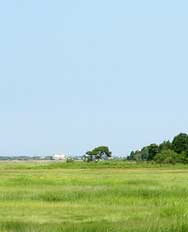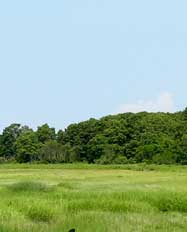Gift of Land or Outright Donation (Fee Simple Transfer)
Giving your land to a non-profit
conservation organization like Yarmouth Conservation
Trust (YCT) is the simplest
way to protect land. It is only necessary to obtain
approval and acceptance from YCT or the organization
or agency (town, state, and federal governments are
also qualified to receive land in this way) to whom
the land will be donated, prior to deeding the land.
If you are interested in a confidential conversation
about the prospect of giving land, then call YCT’s
President Christine Marzigliano at 516-532-4583 or call
conservation advisor Mark Robinson at 1 (508) 694-7415
or email him
at mark@thecompact.net.
A gift ensures long-term protection of the land.
As a donor, you can be eligible for tax benefits
in the form of federal income tax deductions,
potential estate
tax reduction, and relief from property taxes. A donor is relieved of management
responsibilities, and automatically absolved of liability associated with
any trail use or other activity.
The majority of YCT’s protected properties
have been received as gifts. About 80 percent of
the properties preserved by land trusts on Cape Cod
have
been donated. About 30 parcels per year are donated outright in this manner.
Typically, the only cost to the land donor is for an appraisal, which certifies
the value of the donated land for federal income tax deductions. Appraisals
are needed when the claimed value of the deduction is more than $5,000. Land
trusts usually ask donors to pay remaining property taxes on the land before
it becomes tax exempt in the next fiscal year.
Donation by Will (Bequest)
A gift of land made through a will entitles the donor
to retain full use of the land during his or her lifetime
and assures that it will be cared for in the future.
It is advisable to discuss the gift with the agency
or organization prior to inclusion in a will, to ensure
a plan for the care of the land. The donor is responsible
for real estate and income taxes for the property during
his or her lifetime. But removing the land from an
estate will reduce potential inheritance tax for any
heir(s).
Combined, Cape Cod land trusts typically acquire one property per year via
bequests. These properties tend to be large and valuable, often part of a family's
estate. In 1993, the Barnstable Land Trust acquired a large coastal woodland
fringed with salt marsh through a bequest. The donation lowered the value of
the family estate by about $1 million, enabling the family to retain most of
the remaining land, rather than selling it for development to pay high inheritance
taxes.
Donation with a Reserved Life Estate
A donation with a reserved life estate may be made
to a government agency or conservation organization.
The donor retains the use of the land during his or
her lifetime, and the lifetimes of specified family
members. A reserved life estate insures that the land
is protected in perpetuity, yet allows the donor to
reside on it and maintain the land. The tax advantages
with a retained life estate are less that those with
an outright donation.
On Cape Cod, in 1993, a family donated five acres of dune and salt marsh to
the Truro Conservation Trust, while reserving the right to use the parcel for
family boating and beach bathing during their lifetimes. The reserved right
slightly lowered the value of the land gift.
Gifts of Other Properties
Many conservation organizations and agencies will
accept a gift of property with little or no environmental
value, sell it on the open market (with restrictions,
if appropriate), and use the money for the preservation
of other ecologically significant lands. The landowner
is eligible for the same tax benefits as a gift of
conservation land.
This option has been rarely used on Cape Cod. In 1988, the Brewster Conservation
Trust received a gift of title to a time-sharing unit in a local condominium.
The Trust sold the unit for $2,000 and put the money towards the purchase of
the Windmill Meadows parcel. The donor received a tax deduction for the value
of the time-sharing unit.
Back to top
 |
 |
 |
 |
| View of YCT's
34 acre salt marsh from YCT's Green Hill Farm
Conservation
Restriction |
CONSERVATION RESTRICTIONS
or EASEMENTS
A conservation restriction, also known as a conservation
easement, is a legally binding agreement between a
landowner and a qualified nonprofit organization such
as the Yarmouth Conservation Trust (YCT). A qualified
public agency from town, state, or federal government
is also eligible to hold a conservation restriction.
The landowner retains title to the property, but extinguishes
certain development rights in the property.
Recent federal income tax law changes have made 2006 and 2007 the best years
ever to donate a conservation restriction and reap powerful new charitable
deductions.
These new incentives make it easier for landowners
to preserve land:
- A conservation restriction donor can deduct up to
50% of their adjusted gross income in any year
(previously, only 30% each year);
- Conservation restriction donors can use the deductions
for as many as 16 years (previously, only 6 years).
These changes allow modest-income landowners with high-value land to
deduct much more than they could under the previous rules. But
you need to act soon: conservation restrictions typically take about
four months to complete
and need to be recorded before the end of 2007 to realize the new tax
benefit.
For more information call Mark Robinson, YCT conservation advisor,
at 1 (508) 694-7415
Conservation restrictions typically restrict dumping,
mining, paving and development of houses, while
allowing traditional family uses of
the property.
The restricted
land can be sold, but the restriction runs with the land to the new
owner.
Tax authorities recognize the fact that the landowner
has relinquished a significant portion of the property's
economic value by extinguishing
his
or her right
to develop the property to the fullest extent. The Internal
Revenue Service may grant income tax deductions
and estate tax reductions
equal to the value
of the land forgone by donating a permanent conservation easement.
The landowner must conduct an appraisal of the extinguished
value to justify the deduction.
YCT is available to discuss and shepherd the conservation restriction
process as well as explain potential tax relief, but also recommends
that you consult
your own tax advisor about any potential tax savings.
Lands with conservation restrictions are often granted local
property tax relief. Cape Cod towns typically offer a practice
of property
tax reductions
to landowners
who place conservation easements on their land. The reduction
in Yarmouth can be 80% without allowing public access (e.g.
trail) or
95% if public
access is allowed. The property tax reduction reflects the
diminution in value caused
by extinguishing certain development rights such as residential,
commercial, recreational, and/or industrial building potential.
Conservation restrictions have been used effectively on Cape
Cod to protect significant parcels of land. To date, more than
5,000
acres
have been protected
in this manner. Types of land that have been protected by conservation
restrictions include salt marshes, barrier beaches, islands,
dunes, pine barrens, shrub
swamps, meadows, pond shores, and freshwater streams.
About a dozen properties are preserved each year on the Cape
by conservation restriction. A recent example on Cape Cod found
that
5.5-acre parcel
of buildable land was worth $295,000 before the conservation
restriction was donated,
and $85,000 after the restriction. The landowner was entitled
to a $210,000 charitable
deduction for federal income tax. The landowner’s heirs could also benefit
from reduced inheritance tax because the estate’s value
was lowered. The town reduced the land's assessment by 80 percent
as
well.
Deed Restrictions
Deed restrictions guiding the future use of property
may be placed in the deed at the time the property
is transferred. Deed restrictions
differ from
conservation
easements in that there is not a third party that assumes responsibility
for monitoring and enforcing the restrictions placed on the
land. The seller is
responsible for enforcing restrictions placed on a parcel of
land before it is sold. If the seller has placed
restrictions in the deed,
and
retains no
land nearby, he or she may not be able to enforce the restrictions
against the subsequent owners of the land. Under Massachusetts
common law, most deed
restrictions expire after 30 years.
Deed restrictions will usually affect the market value of the
land if they significantly limit development potential. The
presence of
a restriction
may lower the price if the property is sold, or lower the value
of the gift if
the land is donated to a conservation agency. The IRS does
not allow a claim for a loss in value resulting from deed restrictions
as a
charitable deduction.
A donation of land to a conservation agency, in which the agency
inserts the deed restrictions, does allow a claim of the full
fair market value
of the
land as a charitable contribution.
Back to top
SALE
of LAND
Sale at Fair Market Value
Sale at fair market value is the sale of property
at the price a knowledgeable buyer would pay for the
land. Most conservation organizations are not able
to purchase land at full value owing to the high cost
of land and insufficient funds. If the land is sold
at full value and has appreciated in value since its
purchase, the seller will be liable for income tax
on the capital gain. This can affect the net profit
from the sale. There are no charitable deductions associated
with a sale at full value.
Many Cape Cod towns have purchased open space at fair market value, owing to
the intense competition for land during the development boom. A land trust
has almost never paid full value for land, although there are exceptions.
Bargain or Charitable Sale
A bargain sale is part donation and part sale to a
government agency or nonprofit organization such as
Yarmouth Conservation Trust (YCT). A bargain sale may
entitle the seller to a federal income tax deduction
for a charitable contribution and to a reduction in
capital gains tax. The value of the federal income
tax charitable contribution for the seller equals the
difference between the fair market value and the lower
negotiated selling price for charity. The net cash
to the seller at the bargain price may come close to
the fair market sale when the tax deduction is taken
into account.
Capital gains must be calculated on the sale part of the transaction. A gain
is recognized if the property is sold for more than its basis (the basis is
usually equal to the original cost, plus improvements and minus depreciation).
For bargain sales, the basis of the property must be allocated proportionately
between the part sold and the part donated. The income tax charitable deduction
from a bargain sale could be greater that the capital gains tax liability that
results from the sale at fair market value.
In the 1990s, the Truro Conservation Trust purchased six acres of beachfront
land for $200,000; the Orenda Wildlife Land Trust purchased 28 acres of land
in Brewster at less than $5,000 per acre; and the Chatham Conservation Foundation
purchased 23 acres along Goose Pond for $382,000. All of these purchases were
paid for through private fundraising. In each case, the seller received substantial
tax deductions for selling below appraised fair market value to a charity.
Installment Sale
An installment sale allows an agency or organization
to purchase property over a period of years. The use
of the land and the responsibility for payment of property
taxes until the sale is complete are negotiable terms
of the agreement. The seller benefits financially by
spreading the income and the taxable gains over several
years. The amount of taxable gains depends on whether
or not the land is sold at fair market value.
The Bourne Conservation Trust has used this technique successfully to buy many
parcels. In a few cases, the sellers arranged financing by "taking back" mortgages,
enabling the land trust to raise money and pay off the purchases over time.
Back to top |